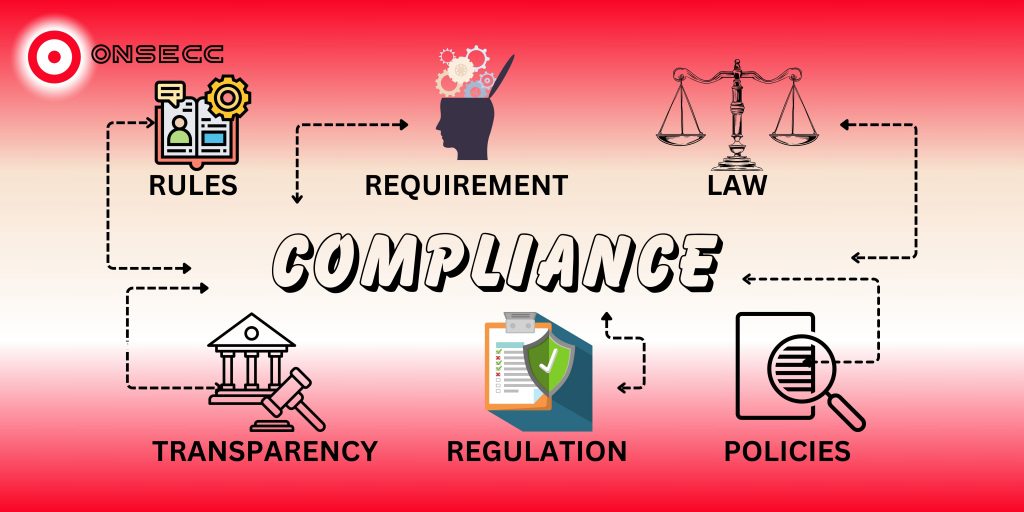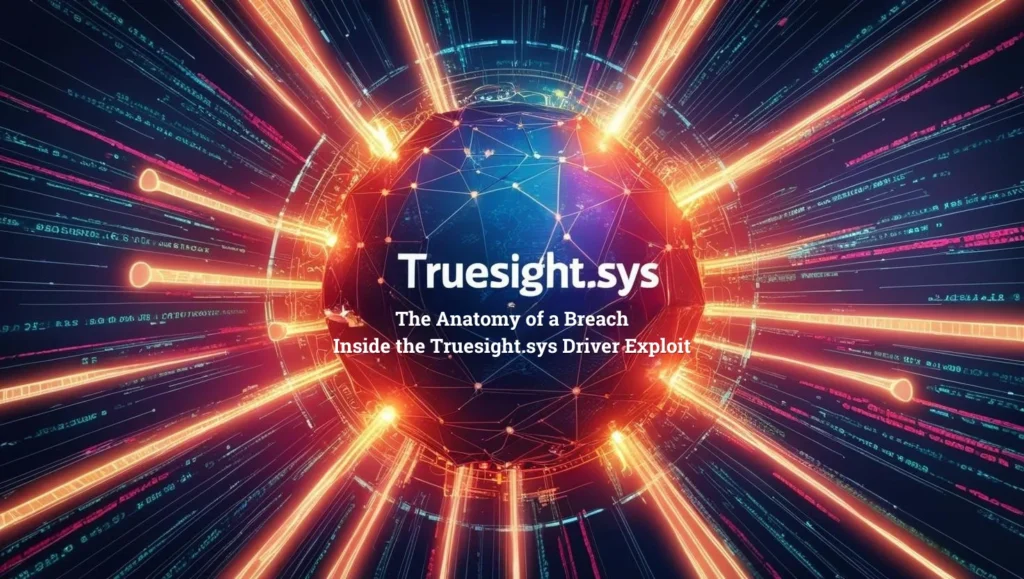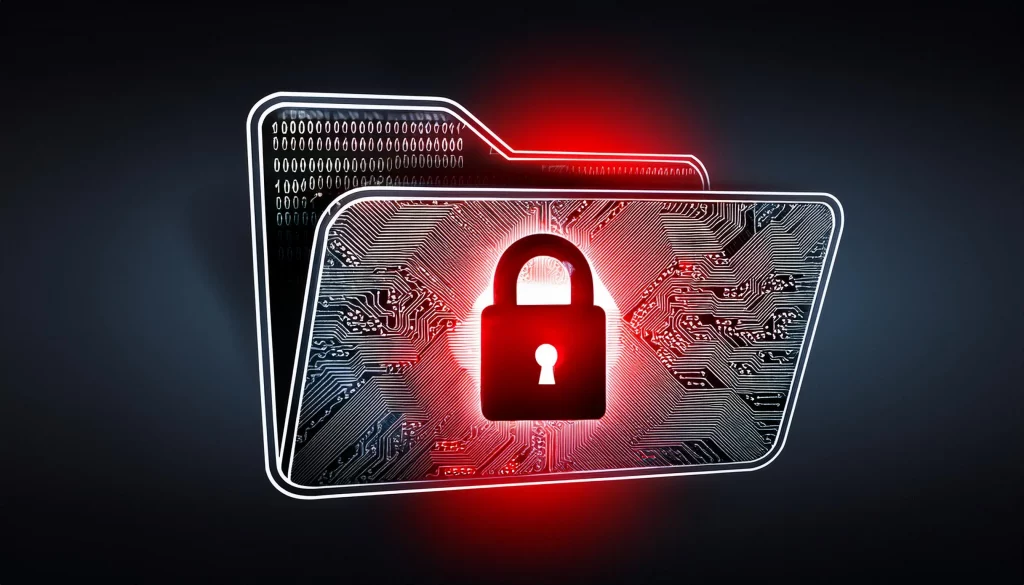What is Compliance and Cybersecurity: Essential for Modern Businesses
What is compliance? In the dynamic landscape of today’s business environment, compliance refers to the adherence to legal and regulatory standards relevant to a particular industry or operation. It encompasses a spectrum of rules and guidelines that govern how organizations handle their data, interact with stakeholders, and conduct their operations. Achieving and maintaining compliance is not merely a legal obligation; it is a strategic imperative. It builds trust with customers, protects the integrity of your operations, and ultimately safeguards your reputation. At Onsecc, we understand the critical importance of compliance in the digital age, and we’re dedicated to guiding businesses towards a secure and compliant future.
In this Article:

Also Read: Cyber Security Compliance for 2023: How AI is changing everything
Introduction
Compliance (Observance) and cybersecurity are paramount in today’s digital world, where the protection of sensitive information is crucial. Businesses must adhere to regulations and industry standards to safeguard data from unauthorized access and build trust with customers. This article will delve into the significance of Observance and cybersecurity, highlighting their role in protecting sensitive information, ensuring legal Observance, maintaining trust and reputation, gaining a competitive edge, ensuring business continuity, and adapting to an ever-changing threat landscape.
What is Compliance
Compliance refers to adhering to rules, regulations, and standards set forth by governing bodies, industry groups, or internal policies within an organization. To illustrate compliance, imagine driving a car. Similar to obeying speed limits, stopping at red lights, and using turn signals for the safety of everyone on the road, businesses must follow rules and regulations in data protection, financial reporting, and other aspects of their operations.
What is Cybersecurity
Cybersecurity involves protecting computer systems, networks, and digital information from theft, damage, or unauthorized access. Analogous to locks and alarms securing our homes, cybersecurity utilizes firewalls, antivirus software, and encryption to fend off cyber threats like viruses, hackers, and malware to protect computer systems and data.
Cybersecurity Compliance and Audit
Cybersecurity Observance implies adhering to specific rules, guidelines, and regulations related to cybersecurity, while a cybersecurity audit evaluates whether an organization meets these compliance requirements. Consider a small online business processing customer payments. To ensure secure handling of information, compliance with industry standards like the Payment Card Industry Data Security Standard (PCI DSS) is necessary. This includes using encryption, conducting security system tests, and maintaining firewalls. Within the context of an audit, an independent review ensures actual compliance. Auditors verify systems, review policies, and request evidence.
Additional Real-life Examples:
Healthcare Compliance and HIPAA:
In the healthcare sector, compliance with the Health Insurance Portability and Accountability Act (HIPAA) is mandatory. Hospitals must follow rules to safeguard patient data, and audits assess compliance.
GDPR Compliance for Online Businesses:
For e-commerce businesses targeting European customers, compliance with the General Data Protection Regulation (GDPR) is essential. Obtaining explicit consent, providing data deletion requests, and more are necessary steps.
Financial Industry and SOX Compliance:
Financial companies must comply with the Sarbanes-Oxley Act (SOX), regulating financial reporting and disclosure. Audits ensure accurate and transparent financial information.
Also Watch: Fortifying Your Business Against Cyber Security Challenges
Conclusion
In conclusion, Observance and cybersecurity are integral to modern business operations, regardless of size or industry. By protecting sensitive data, ensuring legal compliance, maintaining trust and reputation, gaining a competitive advantage, ensuring business continuity, and adapting to evolving threats, businesses can mitigate risks and thrive in the digital landscape. Adherence to these measures is crucial to avoid financial losses, legal liabilities, damage to reputation, and loss of customer trust. It is imperative to stay informed about the latest regulations and best practices to ensure secure and compliant digital activities.
Contact info
- 3rd Floor, 86-90 Paul Street, London, EC2A 4NE, UK
- +44-2034880245
- hello@onsecc.com
Share Blog On
Recent Posts:
-
 Cyber Insurance for Small Businesses: What You Don't Know Could Cost You Everything
Cyber Insurance for Small Businesses: What You Don't Know Could Cost You Everything -
 Meet AkiraBot: The AI Spam Demon Haunting 420,000 Websites (and Counting)
Meet AkiraBot: The AI Spam Demon Haunting 420,000 Websites (and Counting) -
 2,500 Faces of Deceit: The Proliferation of Malicious Truesight.sys Variants
2,500 Faces of Deceit: The Proliferation of Malicious Truesight.sys Variants -
 Zero-Day Vulnerabilities: The Invisible Threat Redefining Cybersecurity
Zero-Day Vulnerabilities: The Invisible Threat Redefining Cybersecurity -
 The Middle East’s Cybersecurity Gap: Building Defenses for a Digital Future
The Middle East’s Cybersecurity Gap: Building Defenses for a Digital Future -
 The Cost of Non-Compliance: What the TfL Cyber Attack Teaches Us
The Cost of Non-Compliance: What the TfL Cyber Attack Teaches Us -
 GDPR in the United States: A Do or Die Situation for Businesses
GDPR in the United States: A Do or Die Situation for Businesses -
 Is Your Business PCI Compliance Certified? Don’t Risk It!
Is Your Business PCI Compliance Certified? Don’t Risk It!
What is Compliance: FAQs
Businesses need to invest in cybersecurity to protect sensitive data, maintain trust with customers, comply with regulations, and safeguard against financial losses and reputational damage caused by cyber incidents.
Common cybersecurity threats include phishing attacks, malware infections, ransomware, social engineering, and denial-of-service (DoS) attacks, all of which aim to exploit vulnerabilities in systems or trick users into revealing sensitive information.
Companies should conduct cybersecurity assessments regularly, at least annually, to identify vulnerabilities, evaluate compliance, and ensure that security measures are up-to-date and effective in protecting against evolving threats.
GDPR (General Data Protection Regulation) is a European privacy regulation. It applies to organizations worldwide that process personal data of European Union citizens, requiring them to protect and manage data responsibly.
Employee training is vital because human error is a significant cybersecurity risk. Proper training helps staff recognize and respond to security threats, reducing the likelihood of successful attacks.
